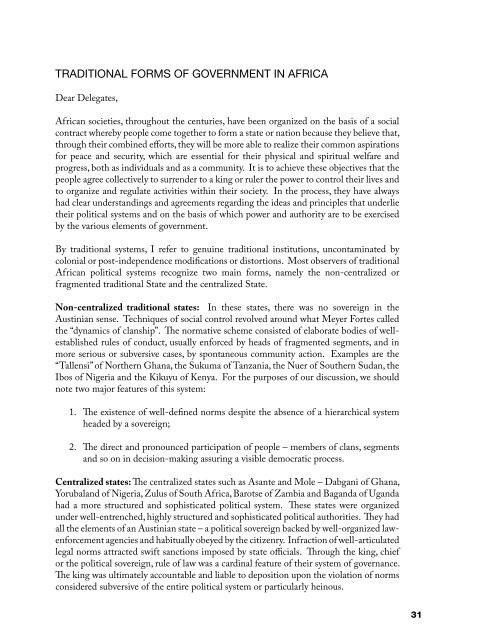Relevance of - United Nations Economic Commission for Africa
Relevance of - United Nations Economic Commission for Africa
Relevance of - United Nations Economic Commission for Africa
Create successful ePaper yourself
Turn your PDF publications into a flip-book with our unique Google optimized e-Paper software.
TRADITIONAL FORMS OF GOVERNMENT IN AFRICA<br />
Dear Delegates,<br />
<strong>Africa</strong>n societies, throughout the centuries, have been organized on the basis <strong>of</strong> a social<br />
contract whereby people come together to <strong>for</strong>m a state or nation because they believe that,<br />
through their combined ef<strong>for</strong>ts, they will be more able to realize their common aspirations<br />
<strong>for</strong> peace and security, which are essential <strong>for</strong> their physical and spiritual welfare and<br />
progress, both as individuals and as a community. It is to achieve these objectives that the<br />
people agree collectively to surrender to a king or ruler the power to control their lives and<br />
to organize and regulate activities within their society. In the process, they have always<br />
had clear understandings and agreements regarding the ideas and principles that underlie<br />
their political systems and on the basis <strong>of</strong> which power and authority are to be exercised<br />
by the various elements <strong>of</strong> government.<br />
By traditional systems, I refer to genuine traditional institutions, uncontaminated by<br />
colonial or post-independence modifications or distortions. Most observers <strong>of</strong> traditional<br />
<strong>Africa</strong>n political systems recognize two main <strong>for</strong>ms, namely the non-centralized or<br />
fragmented traditional State and the centralized State.<br />
Non-centralized traditional states: In these states, there was no sovereign in the<br />
Austinian sense. Techniques <strong>of</strong> social control revolved around what Meyer Fortes called<br />
the “dynamics <strong>of</strong> clanship”. The normative scheme consisted <strong>of</strong> elaborate bodies <strong>of</strong> wellestablished<br />
rules <strong>of</strong> conduct, usually en<strong>for</strong>ced by heads <strong>of</strong> fragmented segments, and in<br />
more serious or subversive cases, by spontaneous community action. Examples are the<br />
“Tallensi” <strong>of</strong> Northern Ghana, the Sukuma <strong>of</strong> Tanzania, the Nuer <strong>of</strong> Southern Sudan, the<br />
Ibos <strong>of</strong> Nigeria and the Kikuyu <strong>of</strong> Kenya. For the purposes <strong>of</strong> our discussion, we should<br />
note two major features <strong>of</strong> this system:<br />
1. The existence <strong>of</strong> well-defined norms despite the absence <strong>of</strong> a hierarchical system<br />
headed by a sovereign;<br />
2. The direct and pronounced participation <strong>of</strong> people – members <strong>of</strong> clans, segments<br />
and so on in decision-making assuring a visible democratic process.<br />
Centralized states: The centralized states such as Asante and Mole – Dabgani <strong>of</strong> Ghana,<br />
Yorubaland <strong>of</strong> Nigeria, Zulus <strong>of</strong> South <strong>Africa</strong>, Barotse <strong>of</strong> Zambia and Baganda <strong>of</strong> Uganda<br />
had a more structured and sophisticated political system. These states were organized<br />
under well-entrenched, highly structured and sophisticated political authorities. They had<br />
all the elements <strong>of</strong> an Austinian state – a political sovereign backed by well-organized lawen<strong>for</strong>cement<br />
agencies and habitually obeyed by the citizenry. Infraction <strong>of</strong> well-articulated<br />
legal norms attracted swift sanctions imposed by state <strong>of</strong>ficials. Through the king, chief<br />
or the political sovereign, rule <strong>of</strong> law was a cardinal feature <strong>of</strong> their system <strong>of</strong> governance.<br />
The king was ultimately accountable and liable to deposition upon the violation <strong>of</strong> norms<br />
considered subversive <strong>of</strong> the entire political system or particularly heinous.<br />
31
















